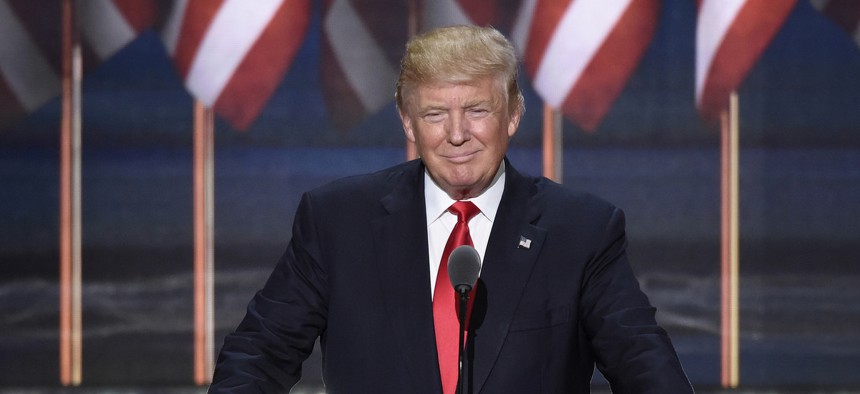
Ida Mae Astute/ABC via Flickr
Why Trump Is Keeping Some Obama Appointees Around
Without any of his key appointees confirmed by the Senate, the incoming president has turned to existing officials to help smooth the transition.
Donald Rumsfeld is not joining the Trump administration, but one of his most famous rules is: “You go to war with the Army you have—not the Army you might wish you have.” Or the secretary of the Army, as the case might be.
With the process of vetting and appointing, to say nothing of confirming, executive-branch officials well behind the optimal pace, incoming White House Press Secretary Sean Spicer said during a briefing on Thursday that “over 50” members of the Obama administration will temporarily remain in their posts to help smooth the transition to the Trump administration.
Spicer did not name all of the officials, nor did he indicate whether others had been asked and declined to stay on. A message to the Trump transition team, asking for a full list, has not been answered. Reuters reported Thursday afternoon that some individuals on a list, dated Tuesday, of appointees being asked to stay on had declined to do so, including the principal deputy director of national intelligence, an undersecretary of state, and an assistant secretary of state.
Here are the people Spicer mentioned:
- Robert Work, deputy secretary of defense (Work’s extension had actually already been reported.)
- Chuck Rosenberg, acting administrator of the Drug Enforcement Agency
- Nicholas Rasmussen, director of the National Counterterrorism Center
- Thomas Shannon, undersecretary of state for public affairs
- Susan Coppedge, a State Department ambassador-at-large focusing on human trafficking
- Brett McGurk, State Department special envoy for combating ISIS
- Kody Kinsley, assistant secretary of the treasury for management
- Adam Szubin, acting undersecretary of the treasury for terrorism and financial intelligence
It’s hardly novel for a president to hold some executive-branch officials over into a new administration. These cases are notable because of what else is known about the Trump transition. The president-elect has been slow to appoint officials, as my colleague Russell Berman wrote earlier this month. With the recent nomination of Sonny Perdue as agriculture secretary, Trump now has a full Cabinet, but below the top positions sit legions of unfilled spots. The Partnership for Public Service and Washington Post identified 690 key administration posts, of which 29 have nominees and none have been confirmed. By way of contrast, Politico notes that every one of Bill Clinton’s Cabinet members was confirmed within two days of his inauguration in 1993.
Trump has been slow to fill those slots because his transition team has been slow to identify and vet figures, which is itself partly a result of tumult on the team—Governor Chris Christie of New Jersey, the erstwhile head, was sacked shortly after the election—and of the fact that winning took even Trump by surprise. Several outlets reported that top Trump aides were surprised to realize that they had to replace all West Wing staff.
The profusion of empty chairs is particularly worrisome because so many Trump appointees have little or no experience in government. Among Republicans with executive-branch experience, some don’t want to work for Trump out of moral or political conviction, while others, particularly in national security, believe they are being blacklisted for opposing him during the presidential campaign.
As a result, some foreign-policy mandarins on both sides of the aisle are worried about whether the State and Defense departments are ready to face a crisis.
“Unlike State, which can rely on its bureaucracy, the NSC has to be ready on Day One as most of its old team leaves,” Philip Gordon, a former top aide to Obama, told Michael Crowley. “In a normal world, even before a single presidential phone call or meeting or decision the NSC team would prepare background, points, facts, etc. They will not have a team ready to do that.”
The conservative journalist Max Boot wrote in Foreign Policy:
Not even deputy secretaries have yet been appointed at the State or Defense departments, much less the crucial undersecretaries and assistant secretaries who are responsible for fleshing out the broad parameters of the administration’s foreign policy. These are the obscure but important officials who do the real work of governing, teeing up the decisions that will be decided by the “principals” at NSC meetings and then translating policy guidance (which in this president’s case is likely to be quite broad) into specific actions.
Keeping these officials in place is probably a wise move, then. What is intriguing about it is that many of them are working on the areas where Trump was most strident about his differences with Obama.
McGurk leads up the effort against ISIS, while Trump lambasted Obama’s handling of the group and insisted he would beat it easily and quickly. Szubin’s brief involves tracking terrorists, another area where Trump claimed the Obama team had been deficient. (Senate Republicans have bottled up his bid for his job to be made permanent on the basis that he supported Obama’s Iran deal—which Trump also blasted.) The same goes for Rasmussen. Work manages the Pentagon, while Trump spent the campaign insisting the military was a weakened mess. Shannon, although a career Foreign Service office, manages the day-to-day workings of the State Department, which Trump also claimed was being poorly run.
Keeping the 50-some officials on the job will help to produce a smoother transition that would occur without them, although the vast number of unfilled posts remains a cause for concern. But keeping them on will also likely help to preserve the policies and approach that Obama espoused.






